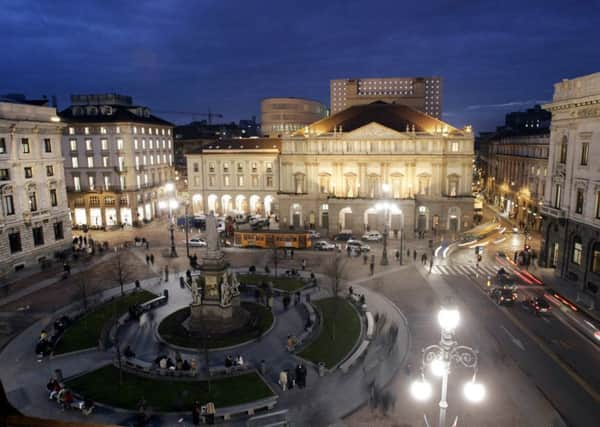Alexander McCall Smith: How I lived to tell the tale of a musical Italian adventure


Last Sunday I travelled back to Scotland from Italy, having been in Reggio-Emilia, a particularly appealing small city not far from Parma. Reggio-Emilia receives relatively few visitors, with the result that it is possible to savour the real life of an Italian town that is untroubled by the multitudes who descend upon Florence or Venice. There is a strong civic sense in Reggio: people seem to know one another’s business and exchange greetings in the street as they parade in the evening – a custom that survives in Italy and is one of the country’s great charms.
I was the guest of the local Rotary Club who had combined to organise an event with my Italian publishers. Afterwards, the Rotarians had a dinner at which local specialities were served, including the two wines produced in that region. One of these is Lambrusco, a fizzy drink not unlike Ribena, but the object of intense local pride. Then there was Parmesan cheese, which comes from the area around Reggio, and that is beyond question the king of cheeses. In the local shops you see great wheels of this cheese, aged for up to three years, and mouth-watering in their yellow promise.
Advertisement
Hide AdAdvertisement
Hide AdMy hosts are anxious, just as we are in this country. They talk about their crisis and tell me that their government has no idea what it is doing. “This can’t go on,” they say. Sooner or later, one of them tells me, the Germans will blow the whistle. I sympathise. We can’t go on either, but appear to be doing so, just as they are. A warm fellow feeling embraces the table.
On Sunday morning it is time to leave. My wife and I travel in a high-speed train from Reggio-Emilia’s impressive new station, an elegant feat of modern architecture and presumably one of the reasons why the country is in such debt. In no time at all we are drawing into Milan Central Station, another echoingly grand structure, in its case an architectural achievement of the Mussolini era. Everything works like clockwork – this is modern, prosperous Europe – clean and punctual.
But then the other Italy makes an entrance, and this is entirely my fault. Descending the great fascist sweep of the marble staircase leading to the adjacent piazza, we were approached by a man enquiring whether we needed a taxi. Now it is an elementary rule of travel anywhere, that when you are approached by a man offering you a taxi, you decline. Because I was concerned about getting to the airport in time, I threw caution to the winds and accepted his offer. My wife demurred, out of proper caution, but I had already committed us.
We were shown to his waiting car. This had unfortunately received several serious dents, which was a of course a warning sign. Never get into a badly dented taxi, as the dents may be telling you something. However, we did – again entirely my fault – and the journey began. I realised immediately it was a mistake.
Off we set, at a cracking pace. Well, I thought, if we actually get there, we shall at least get there in good time. Then something quite astonishing happened. Our driver took a large smart phone out of his pocket and began to watch streamed television while driving. This was a first for me: I had never been in a taxi in which the driver began to watch television while at the wheel. This may or may not be illegal in Italy.
I could not help but see what he was watching as I was seated next to him in the front passenger seat. These were music videos in which various singers crooned their way through increasingly lively numbers to the accompaniment of flashing lights and unrestrained dancing. The phone was held in his right hand while he steered with his left, except when he needed to change channels, when both hands were allocated to the task, the steering wheel being left to its own devices.
He was keen to find out whether I had heard the songs in question, and expressed surprise when I was unable to name them. This resulted in his changing channels to find something with which I might be more familiar. “Are you sure you don’t know this one,” he said, waving the phone in front of me and taking his other hand off the wheel to tap the screen for emphasis.
He was a polite man. When he addressed a remark to my wife, who was seated in the back, he turned around one hundred and eighty degrees, using both hands to underline his remarks with appropriate Italian hand gestures. But he was less polite to other drivers.
Advertisement
Hide AdAdvertisement
Hide AdThroughout the journey we exchanged increasingly aggressive blasts of the horn with other, lesser drivers, most of whom, I imagine, were not watching television at the time.
As we neared Linate Airport, the conversation moved from Italian cuisine to Mr Silvio Berlusconi. I revealed that some years ago I had actually met Mr Berlusconi and had noticed that he had had extensive cosmetic surgery. This led to the driver indicating – again with both hands – where he thought the aesthetic surgery had been performed. “Around the eyes?” he asked. “Here and here?”
We arrived at the airport. We were alive. “What do you like about this country?” he asked, as I paid the fare. I suspected that he did not pay tax, but one should not assume things unfairly.
“Everything,” I replied. “Everything.”
“Thank you,” he said.
